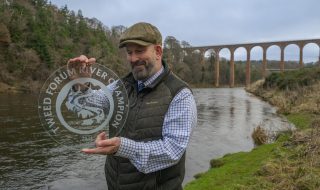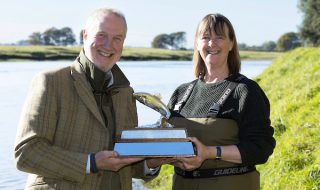Anglers in Lancashire have been compensated for the temporary loss of their fishing on a river once so badly polluted it frequently changed colour.
Water giant United Utilities has settled a £2,500 claim brought by Fish Legal on behalf of seven fishing clubs with rights along the River Calder and the downstream River Ribble to compensate them for the loss of three days of fishing during the height of the salmon fishing season in autumn 2012.
A major mains water pipeline, located near the M62, had burst and eroded tonnes of sediment into a tributary of the Calder at Padiham, discolouring the two rivers and making them unfishable all the way to Preston some 30 miles downstream.
United Utilities was successfully prosecuted by the Environment Agency in 2014 and fined £33,000, but evidence was only put forward for a conservative three days of pollution – which is what the Agency’s records supported – even though it had first been reported by anglers at least two days earlier over a weekend.
Members of the local angling club had themselves traced the source of the pollution – up a small tributary through former industrial land and a housing estate – well before the Agency and the water company took any remedial action.
In the late nineteenth century, contamination from the booming textile industry was so bad that it led to the River Calder being diverted away from stately Gawthorpe Hall, downstream from Burnley.
As the twentieth century saw engineering and chemical plants move into the upper Calder catchment, the river turned into an open foul-smelling drain, regularly changing colour and shunned by the locals.
How times have changed. Not only has the Calder now been sufficiently restored to become a significant game and coarse fishery but anglers are in a position to take legal action for the loss of their fishing from a ‘transient’ pollution incident.
Andrew Kelton, Fish Legal Solicitor, said: “From a legal point of view the settlement is of interest because the law of nuisance, on which the claim was based, is normally used for more permanent impacts, and in most of Fish Legal’s cases usually involves a fish kill on which to base the financial loss.
“In the Calder case, no fish kill was recorded but the settlement reflects the fact that a day’s salmon fishing is valuable as an ‘amenity’, has to be paid for by the angler, and should be compensated for if lost as a result of another’s wrongful acts or omissions.”
John Whitham, Secretary of the Padiham & District and Mid-Ribble Angling Society, said: “Members of our club, and of other clubs within the Ribble Fisheries Consultative umbrella group [which represents anglers’ interests throughout the Ribble catchment] keep a constant look-out for pollution and other threats on the two rivers. They often pick up and report incidents that the Environment Agency would not otherwise have noticed, from slurry spills to sewage leaks.”
Mark Lloyd, Angling Trust & Fish Legal Chief Executive, said: “The prosecution and now settlement of this case are a testament to the vigilance of local anglers who have, in effect, become the eyes and ears of the river, and to the benefits of angling clubs working together at a local level with support from their representative organisations.
“This case sets an interesting precedent for possible future claims against farmers and others who cause excessive sediment to damage the water environment and the amenity value of rivers, even on a temporary basis.”






